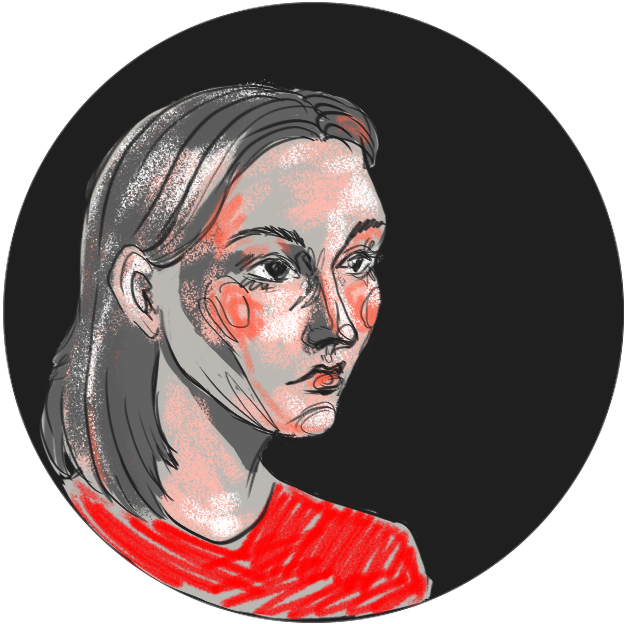Yulya G. calls her habit of living as if nothing is wrong a “privileged illusion”. She lived with this privileged illusion for 25 years, since kindergarten. She went to school, graduated, studied design, and worked as a designer.
Meanwhile, President Lukashenko stayed in power for two presidential terms, then another term, and then another. Yulya didn’t quite understand when exactly Lukashenko appointed himself president for life. The elections were faked, protests were brutally broken up, politicians and journalists disappeared without a trace, but Yulya somehow didn't take any of that personally. She may not have liked it, but no more than she disliked bad weather.
Then suddenly, the coronavirus pandemic broke the camel’s back. Yulya suddenly found President Lukashenko's statements about the coronavirus to be unbearable, horrifically cruel, and downright disgusting. To be fair, those statements were truly awful. For example, The President said that only slackers catch the coronavirus, that people who work on a tractor in the field have no time to get sick, that a tractor, they say, is as good a treatment as any, all sorts of nonsense. These statements weren’t any more tasteless than any of the president’s past observations however. Despite that, they touched Yulya to her core. Who knows how the human psyche works, you keep compromising and compromising, putting up with injustice until you suddenly explode from the tiniest provocation.

Life became so unbearable, change became so necessary, that she believed that not only was change possible, but that it was inevitable. She listened to the speeches of opposition politicians like Sergei Tikhanovsky and Viktor Babariko, and thought: here it is! Change is right here! Neither Tikhanovsky nor Babariko were allowed to participate in the presidential election. Both were sent to prison on trumped-up charges. By some miracle, an hour before the deadline, Tikhanovsky's wife Svetlana was able to register as a presidential candidate. And Yulya thought: here it is! Here it is, the change, it’s so close! Of course, a state cannot become more humane and gentle without a woman at its helm. Despite enormous public support, Tikhanovskaya didn’t stand a chance of being recognized by the state as the winner of the election. But Yulya wanted to believe. So, she did.
She volunteered at a polling station as an independent observer. Not only was she kept away from the ballot boxes, away from the ballots being counted, she wasn’t even allowed inside the school. Instead she was told to sit on a stool in the schoolyard, not even inside the building where voting was taking place. She had to sit on a chair in the courtyard. Despite the obvious lawlessness, Yulya was in a downright festive mood. She really thought that the thoroughly corrupt election commission would leave their secret room where they could lie and cheat without prying eyes and announce the unthinkable - that Tikhanovskaya had won…
Instead, riot police showed up and carted Yulya off to prison.

She did not expect the brutality she had to face. She could not believe that the police officers and investigators weren’t just manipulating the truth in the police reports, but brazenly lying. She couldn’t have imagined that 36 women could be stuffed into a four-person cell like sardines into a tin can. But the authorities WERE cruel, they did lie and they did push 36 women into an 11 square meter cell.
And here Yulya started dying. Her heart started beating faster and faster, and then her heartbeat became irregular. For the first time in her life, Yulya could feel her heart beating. It took her breath away. For the first time, Yulya could feel her diaphragm straining to stretch out her lungs and allow air to flow in. Alas, the air wouldn’t come. Her hands and feet began to numb. Yulya felt pins and needles travelling up all of her limbs, until she couldn’t feel anything anymore. Yulya realized that this is how people die, and a wave of cold, mortal terror swept over her. She tried to jump, scream, bang on the door, call for help, but her body would not obey. All she could do was bug out her eyes.
Zhanna L., her cellmate, a companion in misfortune, saw Yulya's terror-filled eyes. Zhanna got up, stepped over the other women filling the cell, went up to Yulya, hugged her, and stroking her back said:
- Breathe, breathe, everything is fine.
- I’m going to die! - Yulya whispered.
- You’re not going to die. This is just a panic attack. Breathe.
Squeezing past and helping each other, other women approached Yulya. They began to console her, stroke her hair, mutter something - and suddenly death receded. A few minutes later, Yulya managed to breathe and her heartbeat evened out.
Panic attacks are in fact, not life-threatening at all. They are caused by a sudden rush of adrenaline. The main symptoms are a rapid heartbeat, shortness of breath, numbness of the limbs, and an unbearable fear of death. A panic attack ends on its own. But Yulya saw, saw with her own eyes, heard with her own ears, felt with her own skin how these women, these prison sisters of hers saved her from death. After she was released, she rode around the city and saw more women, more sisters with flowers dressed in white clothes. The very appearance of those women, just like back in the cell, seemed to tell Yulya: “breathe!”.
Yulya could not help but fight for them, next to them. After her first arrest, she went out to protest over and over again. Now, she was the one wearing white clothes and holding flowers. She was arrested three more times, and there is no guarantee that she will not be arrested again.
Again and again, until Yulya's dreams of change come true.



